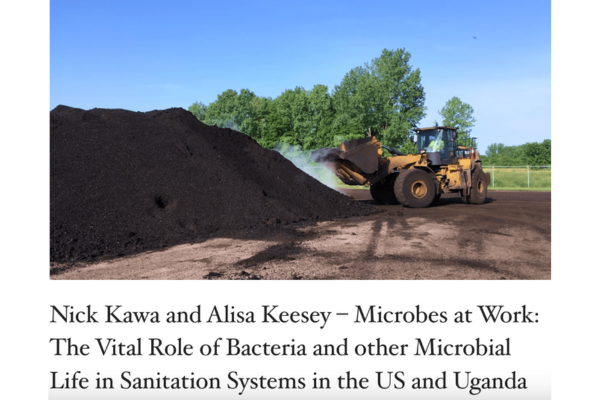
May 19th, Department of Anthropology faculty member Dr. Nick Kawa will be giving a presentation at The Humanities Institute (UC Santa Cruz). Entitled "Microbes at Work: The Vital Role of Bacteria and other Microbial Life in Sanitation Systems in the US and Uganda" Dr. Kawa's presentation will explore how humans collaborate with microbes in managing human waste in two very different contexts: wastewater treatment in Columbus, Ohio, and grassroots sanitation efforts in Kampala, Uganda.
Abstract "Wastewater treatment operators in the American Midwest wryly describe their job as “bacteria farming,” but they also insist that microbes are the ones who “do all the work” at treatment plants. Meanwhile, slum activists in Uganda suggest that they “work with microbes” to provide essential sanitation services where the state has failed to provide safe toilets. In this talk, we delve deeper into these observations about microbial laboring and human laboring with microbes in these two distinct contexts. First, we examine insights from wastewater treatment workers and soil scientists in Columbus, Ohio, to explore how microbes serve as key mediators that not only metabolize urban residents’ bodily excesses in wastewater treatment processing but also constitute the bulk of wastewater solids, which are increasingly used as a soil amendment applied on agricultural lands. Second, we turn attention to slum activists, waste scientists, and entrepreneurs in Kampala, Uganda, who are working to capture “anal resources” and advance container-based sanitation and community-scale composting. The diversion of human waste away from Lake Victoria is especially urgent as nutrients-out-of-place are driving eutrophication and the extinction of indigenous fish species. Through these two case studies, we show how the disruption of socio-ecological systems brought on by industrial capitalism—known in some scholarly circles as the “metabolic rift”—is not strictly characterized by a break in the cycling of nutrients back to the land but also a derangement of social relations with microbial life that requires remediation"
More information on Dr. Kawa's presentation can be found on The Humanities Institute's webpage.
Additionally, Dr. Kawa and his collaborator, Alisa Keesey, are starting work on a new project in Santa Cruz entitled "Container-Based Sanitation: A Sustainable Model for the Future of Climate-Stressed California". Their new project is supported by an OSU Sustainability Institute Seed Grant.
Congratulations Dr. Kawa!
Image: Screen capture - UC Santa Cruz Humanities Institute events page
